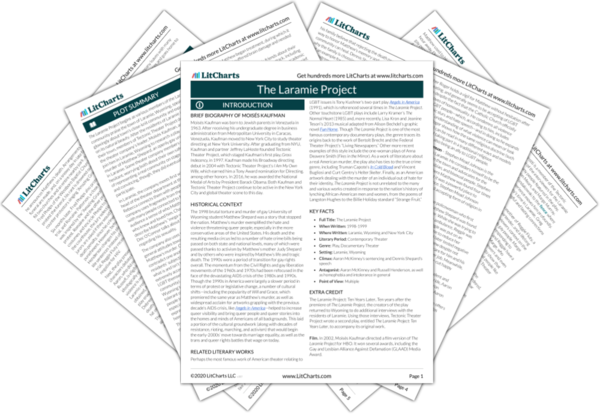Summary
Analysis
During Russell Henderson’s trial, the judge asks Russell if he would like to change his plea, and Russell says he would. The judge confirms Russell’s awareness of the two life sentences he could receive, and the fact that they could be served either concurrently or consecutively. Russell indicates that he still wishes to plead guilty. The judge then welcomes statements before he rules on the sentencing.
As Russell changes his plea, it becomes clear that Russell has taken a plea deal in order to avoid the death penalty, instead taking two life sentences. Russell’s plea deal also avoids the spectacle of a long trial—so, although it may not be as cathartic as a trial, it avoids drawing out the Shepard family’s suffering.
Themes
Lucy Thompson, Russell’s grandmother and former guardian, makes a statement. She offers her sympathies to the Shepard family and says that she has often thought of Matthew Shepard since the attack. Lucy acknowledges that the Shepard family has shown a lot of “mercy” in allowing Russell to plead guilty (presumably to avoid the death penalty). Lucy then expresses her hope that Russell can serve his terms concurrently so he might eventually receive parole.
In Lucy’s statement, she uses the word “mercy” to describe the Shepard family’s decision to allow Russell to take a plea deal. Over the course of Russell and Aaron’s trials, the idea of “mercy” recurs as a complex idea that is often set in opposition to justice. It is also a concept with highly religious undertones, like much of the other rhetoric and imagery in the play.
Themes
The judge then invites Russell Henderson to make a statement. Russell expresses his regret and his sympathy for the Shepard family. He hopes that someday they can forgive him. Russell tells the judge he is sorry for what he did and feels ready to repay his debt. The judge then lists Russell’s crimes and states how exactly Russell is complicit in Matthew’s death. The judge indicates that the Court does not believe that Russell feels any real remorse for his crimes and does not fully recognize their impact. As a result, the judge sentences him two consecutive life sentences, rather than two concurrent ones.
Russell expresses his regret and asks for his sentences to be given concurrently (at the same time) instead of consecutively (one after the other), presumably so that he might eventually receive parole. The judge, however, seems to think that giving Russell the terms concurrently would be excessively merciful, suggesting that there is a limit to how merciful someone can be while still delivering justice. In particular, the judge seems to see remorse as a requisite for mercy.
Themes
After the hearing, the company spoke with Russell’s Mormon Home Teacher. She notes that she has known Russell Henderson for his entire life, and says that when she heard he murdered Matthew Shepard she felt total disbelief. The teacher tells the company that the church decided to excommunicate Russell, which really upset him and made him realize how serious his crime was. The teacher states that she will not “desert” Russell, because of her faith and her connection to his family.
Russell’s Mormon Home Teacher discusses how Russell has been excommunicated from the church, saying it wasn’t until then that he realized the severity of his crimes. This speaks to how significantly the church can affect people’s understandings of morality, showing the importance of strong religious leadership for the people of Laramie.
Themes
Get the entire The Laramie Project LitChart as a printable PDF.













